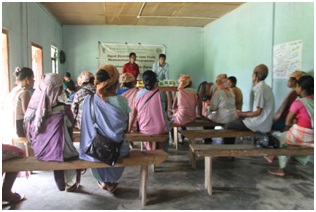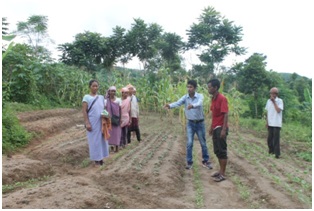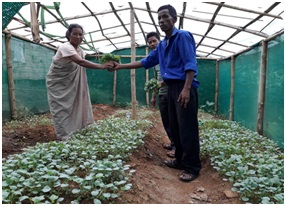“Input distribution cum field demonstration programme on promotion of organic farming under Tribal Sub Plan (TSP)”
The introduction of chemicals in farming create a host of several problems such as health related diseases, pollution, degradation of soil and water, and perilous impact on domestic animals. Organic farming in holistic terms excludes the use of any synthetic substances to maintain soil fertility and ecological balance thereby minimizing pollution and wastage. Although farmers of Meghalaya harbour a good deal of traditional knowledge in organic farming, it is difficult for substantiating scientific organic farming practices to propagate among these farmers. Therefore, there is a need to make farmers aware the actual importance, practicing as well as promoting organic farming in this region. In this regard, the Division of Crop Production, ICAR Research Complex for NEH Region, Umiam under the Network Project on Organic Farming (NPOF) putting efforts forward by conducting series of field demonstration programmes. One such programme was organised on the 16th August, 2018 at Mynsain village, Ri-Bhoi District, Meghalaya with primary objective of “promoting organic farming in the adjacent and suitable villages of Mynsain which is adopted under the NPOF project. Altogether 25 keen and interested farmers from the village were attended the field demonstration programme.
In this field demonstration programme, Dr. Jayanta Layek, Scientist (Agronomy) & PI (NPOF), explained the importance of organic farming and appropriate ways to increase the area under organic farming. He also explained that proper application of organic fertilizers (farm yard manure and vermicompost), method of line sowing and maintainance of spacing between line/seeds are crucial to get higher yield under organic farming set up. Dr. Utpal Dey elaborated the farmer groups about the dangers of entry of the pesticide residue into our human body and possible health disturbances caused by the synthetic fertilizers and pesticides. He also explained that the integration of farm enterprises viz., crops, poultry, piggery, fruit trees, fishery, vermicomposting unit etc., will help in maintaining and sustaining the soil health, agro-ecosystem as well as it enhance farmer’s income. Seed priming with biocontrol agents such as Trichoderma harzianum + Pseudomonas fluorescens) @ 10-15 g/kg of seed or soil application of biocontrol agents (mix 4-5 kg per hectare biocontrol agents viz., Trichoderma, Pseudomonas, Beauveria bassiana, Metarhizium with 1000 kg of well decomposed FYM at 10-15 days before sowing) will help to overcome the seed/soil borne pests. Miss Daphibanri Lyngdoh has discussed the merits of using organic fertilizers and highlighted about the ways these fertilizers helps in improving the soil structure and texture, fertility, plant vigour and crop yield. She also explained the advantages of cultivating green manures and legumes, recycling and composting of crop wastes and animal manures, mulching on the soil surface etc.
At the end of the programme, agricultural inputs (seeds, seedlings, organic pesticides, organic manures etc) were distributed among the farmers.


